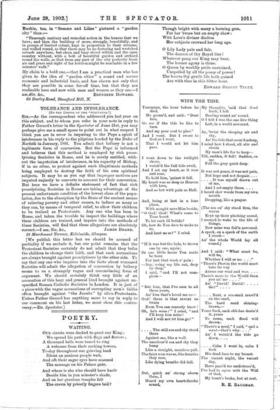TOLERANCE AND INTOLERANCE.
[To THE EDITOR OF THE "SPECTATOR." j Sin,—As the correspondent who addressed you last year on this subject, and to whom you refer in your note in reply to Father Gerard's letter in the Spectator of June 21st, you may perhaps'give me a small space to point out in what respect I think you are in error in imputing to the Pope a spirit of intolerance in his reply to the pilgrims beaded by the Duke of Norfolk in January, 1901. You admit that bribery is not a legitimate form of conversion. But the Pope is informed and believes that this method is employed by rich prose- lytising Societies in Rome, and he is surely entitled, with- out the imputation of intolerance, in his capacity of Bishop, if in no other, to protest against such illegitimate methods being employed to destroy the faith of his own spiritual subjects. It may be as you say that improper motives are imputed unjustly to converts to account for their conversion. But here we have a definite statement of fact that rich proselytising Societies in Rome are taking advantage of the present unfortunate condition of the lowest class of the popu- lation, due to the absorption by the State of the ancient means of relieving poverty and other causes, to induce as many as they can, by means of temporal relief, to allow their children to be trained as Protestants. Any one who has been in Rome, and taken the trouble to inspect the buildings where these children are trained, and inquire into the methods of these Societies, will find that these allegations are absolutely 10 lifarchmont Terrace, Kelvinside, Glasgow.
[We publish this letter lest we should be • accused of partiality if we exclude it, but our point remains that the Protestant Societies certainly do not admit that they bribe the children to change their faith, and that such accusations are always brought against proselytisers by the other side. To say that any one who inquires into the facts about unnamed Societies will admit the allegation of conversion by bribery seems to us a strangely vague and unconvincing form of argument. We should certainly think very little of an accusation of this hazy and general kind brought against un- specified Roman Catholic Societies in London. It is just of a piece with the vague accusations of corrupting men's faiths often brought against "the Jesuits" by ultra-Protestants. Unless Father Gerard has anything more to say in reply to our comment on his last letter, we must close this contro- versy.—En. Spectator.]


















































 Previous page
Previous page